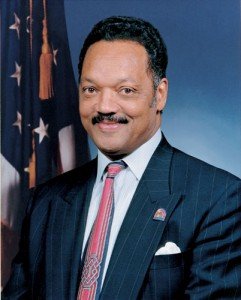Donald Trump's Symbols and The Substance of Division
Jesse Jackson | 8/25/2017, 8:08 a.m.
Symbols are important. Donald Trump, whose fortune is built upon a brand, and whose presidential campaign brandished symbols far more than reform ideas, knows that well.
When Trump tweets his regret that the removal of "beautiful statues and monuments" commemorating the Confederacy subverts "the history and culture of our great country," he knows the message he is sending.
As Eric Foner, the eminent historian of the Civil War period, writes in the New York Times, statutes to Confederate leaders "say a lot more about the time they were erected than the historical era they evoke." The first great surge of Confederate monuments was built in the 1890s as segregation -- legalized apartheid -- was being enforced across the South. The second wave came in the 1920s, marking the height of segregation and of lynching. The third wave came in the 1950 and '60s in reaction to the civil rights movement.
Foner cites historian Carl Becker, who wrote that "history is what the present choose to remember about the past." It is not surprising that the symbols of segregation and white supremacy, of succession and sedition now are under attack. Trump's decision to tout the symbols of the Confederacy sends a message that is clear to everyone.
What is particularly vicious about the Trump presidency is that his embrace of the symbols of oppression is accompanied by policies that push the substance of oppression. His Justice Department sides with voter suppression, not voting rights. It pushes for harsher criminal sentences in drug cases and abandons efforts to reform policing, despite the reality of entrenched, racially biased practices. His "health care reform" was in fact a wealth bill, designed to strip millions of low wage and elderly workers of health care in order to pay for tax breaks for the very few.
His budget -- featuring deep cuts in support for public education, for Pell grants for needy students, for food stamps and affordable housing -- savages programs for the vulnerable -- disproportionately people of color -- in order to offer up even more tax breaks for the corporations and the rich. His posturing on the "wall," his Muslim travel ban and his ramping up of deportations back up his purposeful insults to Mexicans and Muslims during the presidential campaign. Symbols and substance go together. There is no confusion about where Trump stands.
Trump's symbolic posturing has offended conventional opinion. Republican leaders such as Sen. Robert Corker of Tennessee have questioned not only whether Trump has the "competence" but also whether he has the "stability" to be president. Others have criticized Trump's effort to equate neo-Nazis with those who protest against them.
Addressing the symbols is important. Drawing the line against neo-Nazi movements is essential. The question, however, is whether the legislators continue to support Trump's policies even as they express dismay about his divisive comments.
As he departed from the White House, Trump's "strategist" Steve Bannon exposed what we know is the cynical strategy. Scorning the white supremacists as "clowns," Bannon revealed their utility: The longer Democrats "talk about identity politics, I got 'em," he told Robert Kuttner of the American Prospect. "I want them to talk about racism every day. If the left is focused on race and identity, and we go with economic nationalism, we can crush the Democrats."
Throughout our history, cynical politicians have used race-bait politics -- dividing working and poor people from one another -- to serve the powerful. Now, with inequality at obscene extremes, and the vast majority of Americans understanding that the rules of this economy have been rigged, it isn't surprising that someone with Trump's agenda would seek to fan the flames of racial division.
Dr. Martin Luther King argued, "The arc of the moral universe is long but it bends toward justice." That isn't inevitable. It depends upon the active engagement of people of conscience working to make this a more perfect nation, with liberty and justice for all. Now more than ever, we need a new justice movement, turning back the efforts to divide us in both symbols and substance.
You can write to the Rev. Jesse Jackson in care of this newspaper or by email at jjackson@rainbowpush.org. Follow him on Twitter @RevJJackson.




